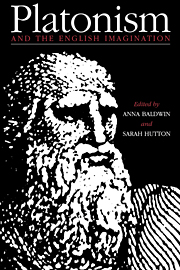Book contents
- Frontmatter
- Contents
- Notes on contributors
- Preface
- I ANTIQUITY
- II THE EARLY CHRISTIAN PERIOD AND THE MIDDLE AGES
- III THE RENAISSANCE AND THE SEVENTEENTH CENTURY
- IV THE EIGHTEENTH CENTURY
- V THE NINETEENTH CENTURY
- 18 Introduction
- 19 Recollection and Recovery: Coleridge's Platonism
- 20 Wordsworth's Ode on the Intimations of Immortality
- 21 Shelley, Plato and the political imagination
- 22 Arnold, Plato, Socrates
- 23 Flux, rest and number: Pater's Plato
- VI THE TWENTIETH CENTURY
- Bibliography
- Index
20 - Wordsworth's Ode on the Intimations of Immortality
Published online by Cambridge University Press: 15 December 2009
- Frontmatter
- Contents
- Notes on contributors
- Preface
- I ANTIQUITY
- II THE EARLY CHRISTIAN PERIOD AND THE MIDDLE AGES
- III THE RENAISSANCE AND THE SEVENTEENTH CENTURY
- IV THE EIGHTEENTH CENTURY
- V THE NINETEENTH CENTURY
- 18 Introduction
- 19 Recollection and Recovery: Coleridge's Platonism
- 20 Wordsworth's Ode on the Intimations of Immortality
- 21 Shelley, Plato and the political imagination
- 22 Arnold, Plato, Socrates
- 23 Flux, rest and number: Pater's Plato
- VI THE TWENTIETH CENTURY
- Bibliography
- Index
Summary
Platonism has left no more manifest imprint upon English poetry than within Wordsworth's Ode finally subtitled ‘Intimations of Immortality from Recollections of Early Childhood’: it takes up the idea that each human soul exists before conception and birth for which Plato argues, most familiarly,in the Phaedo (72e–78b). And yet there is no proof that at the times of writing the Ode (March and June 1802, and early 1804) Wordsworth had any direct acquaintance with any work by Plato. At Cambridge in his day Plato was neglected. The sale catalogue of his library at Rydal Moun included both Forster's 1765 edition of the Phaedo and Thomas Taylor's 1793 translation, but we do not know when these came into his possession. It may be that he had already become acquainted with certain writings after Plato: the ‘sack full of books’ which Coleridge brought over on 10 June 1802, exactly a week before Wordsworth resumed his Ode, may have contained a compendium of excerpts edited by Ficino in 1578 from Proclus and others which Coleridge acquired in 1796; possibly it also contained a work by Thomas Burnet, The Sacred Theory of the Earth (1681–9), which Coleridge admired.However, a letter that Dorothy wrote to De Quincey on 7 July 1809 warnsus against assuming much of William's Grasmere library: ‘This Library is in fact little more than a chance collection of old books (setting aside the poets and a few other Books that are to be found everywhere)’; she continues by requesting any cheap editions of Burnet and of ‘translations from the Classics, mostly historical'including Thucydides but not Herodotus, whom he had already.
- Type
- Chapter
- Information
- Platonism and the English Imagination , pp. 217 - 228Publisher: Cambridge University PressPrint publication year: 1994



